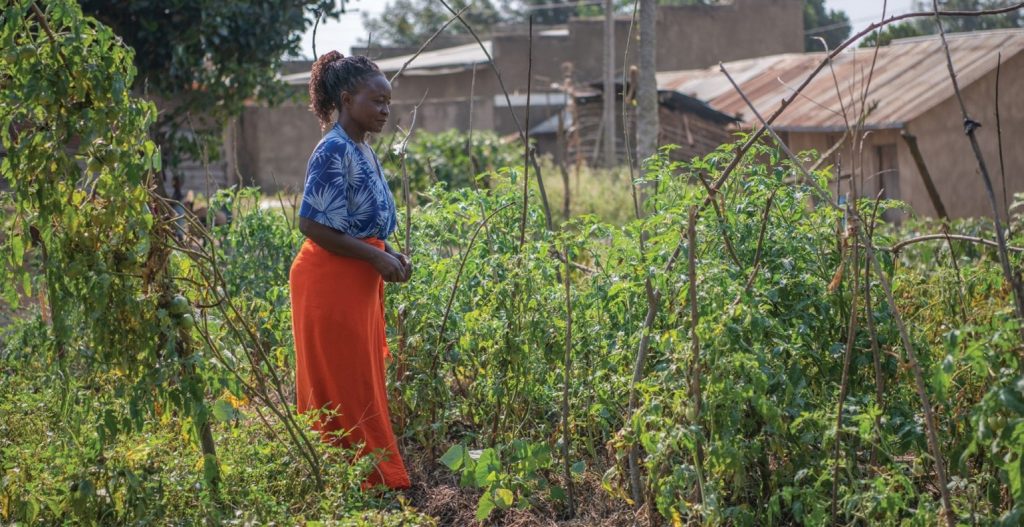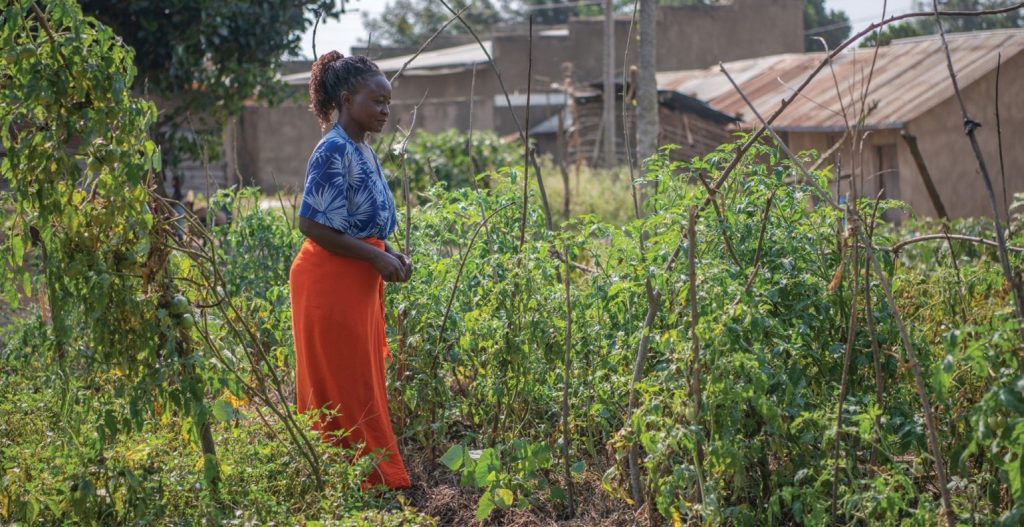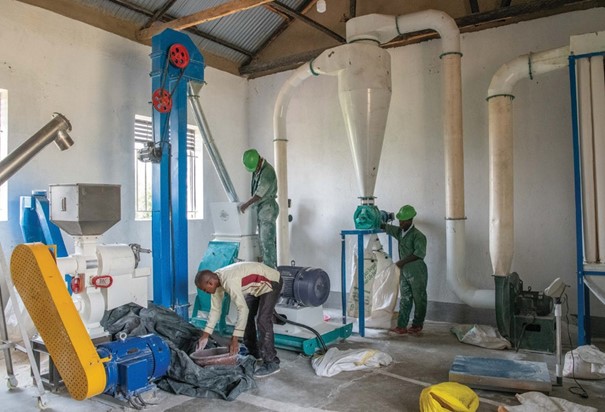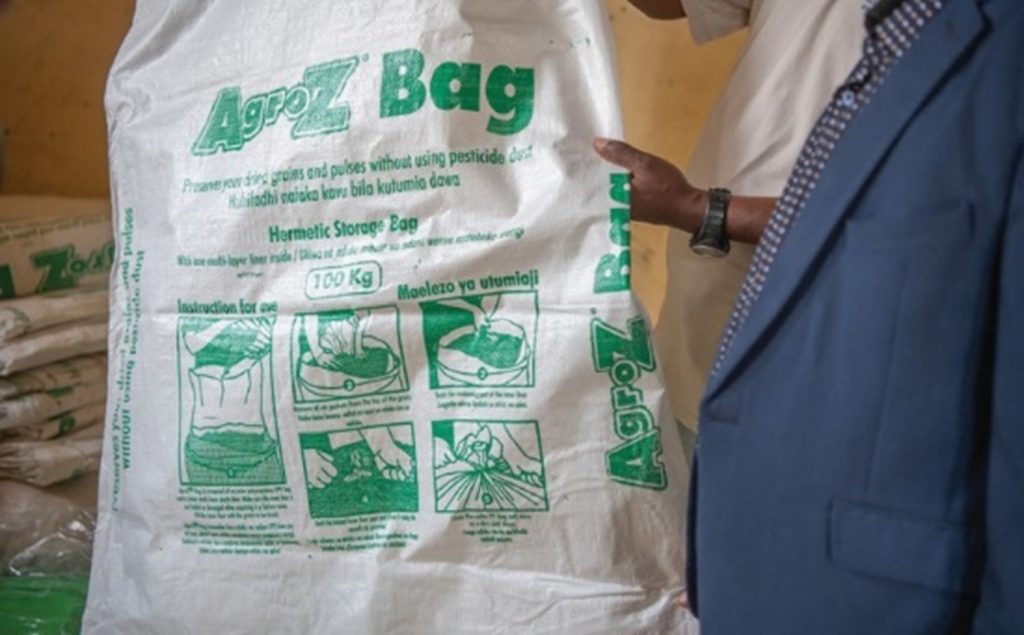
Click here to download this story as a PDF

Emmanuel Ntamushobora chairs the Kyendangara Area Cooperative Enterprise, or ACE, in Mahyolo Town Council in Kitagwenda District, Uganda. The organization was formed in 2005 as a small association of 30 members and has since grown in membership, staff and infrastructure. The ACE is now a secondary cooperative enterprise with a board of directors and supports 1,296 farmers and three rural producer organizations—almost 75% of the farmers are women.
Emmanuel says the cooperative sought out U.S. Agency for International Development’s Farmer- to-Farmer, or F2F program, implemented in Uganda by Catholic Relief Services because it saw a need for training in business practices like leadership, governance and record keeping. The goal was to better serve its farmers.
The training in leadership taught participants management and meeting skills, and the importance of adherence to the cooperative’s bylaws. The cooperative has since been able to conduct meetings, write minutes, record decisions and conduct annual general meetings according to the bylaws.
The training in record keeping helped the cooperative to keep financial and producer records for sales and purchases, and to recruit qualified staff to manage these records. As a result, the office now has a cashbook, vouchers and prepared accounts approved by the manager, with an accountant and machine operators.
Emmanuel says that since working with the F2F volunteer in five distinct technical areas, the cooperative has achieved significant results in leadership and record keeping, enabling it to better manage its operations and support its farmers. A stronger organization with clear strategic and business plans has enabled a clear growth path and has generated immediate benefits to the farmers.
The cooperative submitted a business plan to the government to receive support for providing agricultural inputs such as agrochemicals, tarpaulins, packaging materials and farming tools to the farmers.
Following strategic planning development, the cooperative developed a five-year strategic plan and a two-year business plan. It also submitted a proposal to the government seeking support for a maize milling machine.
“Our proposal went through, and we have been supported with a maize milling machine that can produce one ton of maize flour per hour.”
—Emmanuel Ntamushobora
“Our proposal went through, and we have been supported with a maize milling machine that can produce one ton of maize flour per hour,” Emmanuel says. “We process it, then we sell. Then, as we collect the maize from the farmers, we pay them cash or the farmers themselves can come and mill the maize from the processing machine.”
The cooperative aims to improve financial management, train members on climate-smart agriculture and safe use of agrochemicals, protect the environment and provide agricultural inputs to farmers. It has also partnered with the Environmental Conservation Trust of Uganda, or ECOTRUST, to distribute energy-saving stoves which reduce the need for firewood and protect the environment.
Furthermore, the cooperative has worked on policy development, including creating a human resource manual and a financial manual that outlines how funds are managed and who approves them. These documents have been put to use and are benefiting both the cooperative and the farmers they work with.
Emmanuel said the cooperative’s five-year strategic plan includes income-generating activity such as milling, employing the community, and expanding their capacity to transport and deliver their products to buyers.
“In our five-year strategic plan, we want to acquire a truck that could help us collect the produce from the farmers,” Emmanuel says. “That same truck could help us in transporting the maize flour to the traders we are supplying. We believe we can have three to five contracts with some big buyers.” Emmanuel noted the impact that followed working with a F2F volunteer.
The cooperative initially had no paid staff, but now has paid staff members including a security guard, two extension workers, an accountant and a project manager. The number of farmers registered with the cooperative has grown from 800 to 1,296 over three years, with 75% of the members being women.
The direct benefits to farmers include working with the government to access agro inputs, which allow farmers to obtain tarpaulins for drying maize, use the milling machine, and establish contact with maize sellers within the community who sell maize from the cobs. Members pay $36 to be part of the cooperative, with $2.70 for membership, $27.80 for shares, and $5.50 for annual subscription fees.



The cooperative provides opportunities for farmers through the Agriculture Cluster Development Project, where the government provides 65% of the funds and the farmers pay the remaining 35%. Emmanuel called it a major opportunity for farmers, specifically those working with their cooperative.
“The government accepted our proposal, and they identified the supplier who could bring these agro inputs to the farmers. We are supplying tarpaulins to the farmers, especially for cleaning the grain. We supply agrochemicals that control the pests. We are also supplying packaging materials. They are here in the store, and we are supplying them. If it was not for that training, we wouldn’t have succeeded with that proposal to the government,” Emmanuel says.
Along with growing and processing food, the co-op also wanted to help farm families eat more nutritious meals.
Emmy Byamukama is a change agent working with the Kyendangara ACE. She participated in F2F training on nutrition, with a focus on children and older adults.
She has done demonstrations for more than 50 families on how to prepare simple, nutritious meals with different ingredients that can be grown in kitchen gardens—small, productive and easily- tended plots that provide energy-rich vegetables for families. She expects her trainings to be passed on to others as well.
“When we talk to their neighbors they say, next time I will also come and join your trainings,” Emmy said. “That means they have looked at their neighbors and are interested now. So, we expect to get more adapters than we have today.”

The CRS F2F program is a USAID-funded program focused on reducing hunger, malnutrition, and poverty across six countries: Benin, Timor-Leste, Ethiopia, Nepal, Rwanda, and Uganda. The program runs from 2019-2023 and aims to generate sustainable and broad-based economic growth in the agricultural sector. U.S. volunteers with agricultural expertise share skills and help build capacity for farmers through short-term training and technical assistance projects resulting in more productive, profitable, sustainable, and equitable agricultural systems.
Photos by Holly Powers/CRS